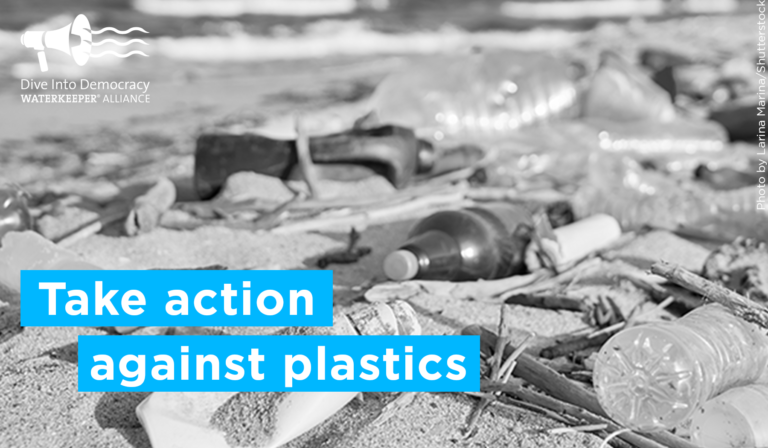Support the Break Free From Plastic Pollution Act
By: Thomas Hynes

The Break Free From Plastic Pollution Act was introduced on March 26 by Senator Jeff Merkley (OR) and Representative Alan Lowenthal (CA) into both the U.S. House of Representatives and the U.S. Senate. If passed, this would represent the federal government’s most consequential and earnest commitment to combating the plastic pollution crisis.
It is crucial that Congress act now to stem the toxic tide of plastic waste before this alarming situation gets even worse. Join us in contacting your Members of Congress below in support of this historic legislation.
Right now, more than 400 million tons of plastic are manufactured every year and over 300 million tons of plastic waste is created. Plastic is detrimental to our climate, communities, and the environment at nearly every step of its lifecycle: from extraction of the fossil fuel building blocks, to chemical processing, to manufacturing, to disposal, and even during recycling. Worldwide, less than 10% of plastic is recycled. But that number might get even lower as recycling markets dwindle due to oversupply. Not only does plastic pollute our air and water, it disproportionately harms Black, Indigenous, people of color (BIPOC) and low-income families living in frontline communities near petrochemical facilities, landfills, incinerators, and other waste management facilities.
While most landfills do not create a permanent solution, tragically, a lot of plastic waste never even makes it to a landfill. Every year, nearly 8 million tons of plastic end up in the world’s oceans, rivers, lakes, and bays. To put that into perspective, in the U.S. alone it would be akin to a garbage truck full of plastic being dumped into our waterways every single minute. By 2050, the amount of plastic in the world’s oceans is expected to outweigh all the fish in the sea. The vast majority of plastic is not biodegradable, and instead reduces to minuscule microplastics which remain in the food chain and ecosystem practically forever. It’s estimated that every American eats about a credit card’s worth of plastic every week. And most plastic is not “just” plastic: many plastics contain additives known to cause health problems. So even if thinking about all that plastic pollution doesn’t make you physically sick, ingesting microplastics unknowingly just may.
This crisis cannot continue. Join us in demanding Congress take action today.
The Break Free From Plastic Pollution Act, which builds off of successful state and local laws across the country, would phase-out certain single-use plastics made from fossil fuels and suspend permitting of new plastics production facilities until pollution impacts and environmental justice concerns are better addressed. The legislation would also hold plastic manufacturers accountable for their role in plastic pollution and help ensure that recycling is actually happening. It would shift costs from local taxpayer-funded governments to manufacturers instead, and incentivize the use of recycled materials.
If passed, the Break Free From Plastic Pollution Act has the potential to reduce the need for more landfills, and reduce the excessive harm placed on frontline communities that shoulder more than their share of the burden.
Congress has the opportunity to meet this problem head on before it spirals out of control further. The United States currently leads the world in plastic waste. But we can also begin a meaningful turnaround by breaking free from plastic pollution today.
Your support can help turn this proposed legislation into a reality. Contact your Members of Congress today in support of this historic legislation ↓